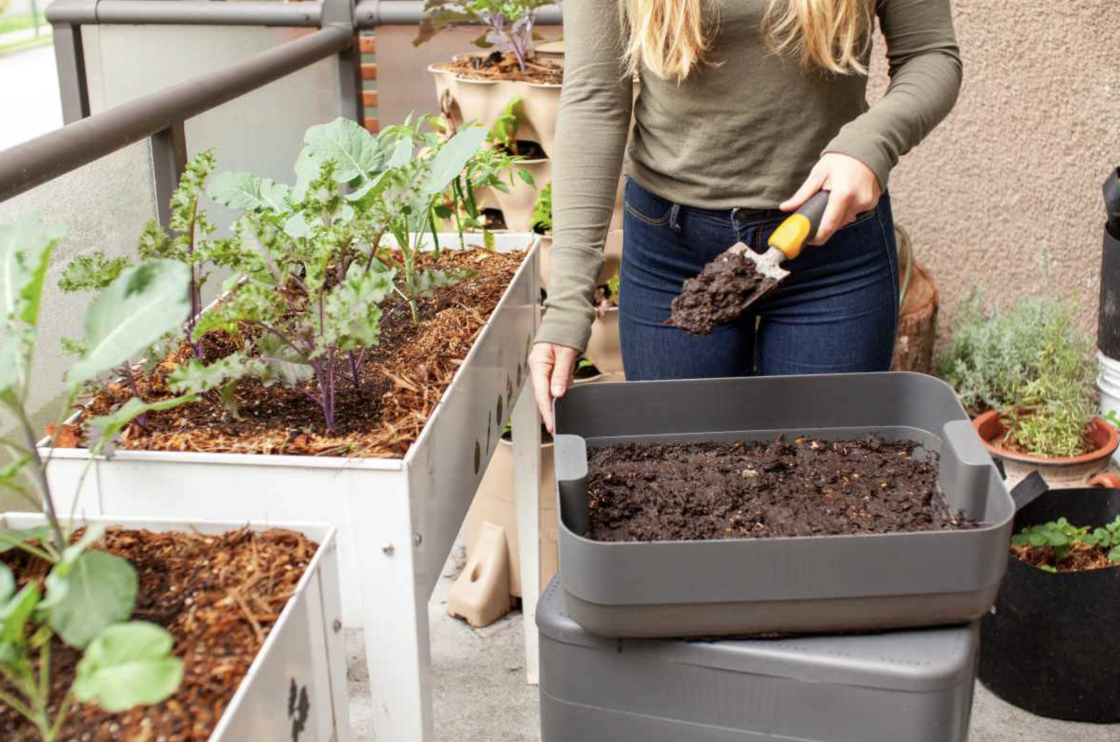Urban homesteading is a lifestyle that involves growing and producing food, conserving resources, and living sustainably in an urban or suburban environment. It emphasizes self-sufficiency, simplicity, and a connection with nature. Urban homesteaders often grow their vegetables, herbs, and micro-greens, bake things at home like sourdough bread, compost food waste, and conserve water and energy. The ultimate goal of urban homesteading is to reduce reliance on store-bought goods and live a more sustainable, self-sufficient healthy lifestyle that is in tune with nature to the best of your ability considering the city living.
How to get started with urban homesteading?
Getting started with urban homesteading involves a few key steps:
Assess your space: Look at your living space, whether it’s an apartment balcony, a small backyard, or a rooftop garden. Consider the amount of sunlight, shade, and wind exposure in the area and think about what you want to grow.
Start small: It’s essential to start small and not overwhelm yourself. Start with a small garden bed or a few potted plants and work your way up as you gain experience.
Choose your crops: Select crops that are well-suited to your space and skill level. Choose easy-to-grow vegetables like tomatoes, herbs, and lettuce.
Gather your equipment: Depending on your goals and available space, you may need equipment such as garden tools, composting bins, rain barrels, seed-starting trays, and raised garden beds.
Educate yourself: Learn about the basics of urban homesteading, such as composting, soil health, pest control, and plant care. Join online forums or local groups to connect with other urban homesteaders and learn from their experiences.
Remember, urban homesteading is a journey, not a destination. It takes time, patience, and a willingness to learn and adapt. Start small and enjoy the process of creating a more sustainable, self-sufficient lifestyle.
What are the best garden Types and vegetables to grow as an urban homesteader?
As an urban homesteader, there are many types of gardens and vegetables that you can grow, depending on your available space and climate. Here are some of the best options to consider:
Container Garden: If you have a small balcony or limited outdoor space, container gardening can be an excellent option. You can grow herbs, lettuce, cherry tomatoes, peppers, and other small vegetables in pots or containers.
Raised Garden Bed: If you have a small backyard or patio, you can build a raised garden bed. This will allow you to grow a wider range of vegetables, including carrots, potatoes, cucumbers, and beans.
Square Foot Garden: Square foot gardening is a method that involves dividing a raised bed into sections and planting specific vegetables in each square. This method maximizes the use of space and is ideal for urban homesteaders with limited space.
Vertical Garden: If you have a wall or fence that receives plenty of sunlight, consider creating a vertical garden. This method involves growing plants on a trellis, wall-mounted planters, or hanging baskets.
Microgreens: Microgreens are a popular choice for urban homesteaders because they can be grown indoors and harvested quickly. You can grow microgreens in small containers or trays and enjoy fresh, nutrient-rich greens all year round.
When it comes to choosing vegetables to grow, consider choosing easy-to-grow, high-yield options. Some of the best vegetables for urban homesteaders include tomatoes, peppers, lettuce, kale, chard, spinach, beans, peas, and herbs like basil and parsley. Ultimately, the best vegetables to grow will depend on your growing conditions and personal preferences.
What are the Financial Savings and Health Benefits of Urban Homesteading?
Urban homesteading can provide both financial and health benefits. Here are some examples:
FINANCIAL SAVINGS
Reduced grocery bills: By growing your food, you can reduce your reliance on store-bought produce and save money on grocery bills.
Reduced transportation costs: When you grow your food, you don’t have to rely on transportation to get fresh produce, reducing your transportation costs.
Lower energy bills: By composting, conserving water, and using renewable energy sources, you can reduce your energy bills.
HEALTH BENEFITS
Access to fresh produce: By growing your food, you can enjoy fresh, nutrient-rich produce that you may not find in stores.
Reduced exposure to pesticides: When you grow your food, you can control the use of pesticides and avoid exposure to harmful chemicals.
Physical activity: Gardening can provide a form of exercise that can improve cardiovascular health, strengthen muscles, and reduce stress.
Mental health benefits: Gardening can also promote mental well-being, reduce stress levels, and provide a sense of satisfaction and accomplishment.
In conclusion, urban homesteading in Canada is more than just a lifestyle choice, it’s a way of life that promotes self-sufficiency, sustainability, and health. By getting your hands dirty and growing your food, you can save money, reduce your carbon footprint, and reap the many health benefits that come with gardening. Plus, who doesn’t love the taste of fresh, homegrown produce? So, whether you’re a seasoned green thumb or a budding gardener, why not give urban homesteading a try and start enjoying the fruits of your labor? Your taste buds, wallet, and planet will thank you!
Homesteading Blogs in Canada
Wild Bluebell Homestead
Northern Homestead
Walkerland
Wilderstead
Modern Homesteading
Hogs and Horns Homestead
Mohawk College
Just Another Day On The Farm
Long Way Homestead
Off Grid and Free
Feedspot
An Off-Grid Life
Homesteading.com
Pure Living for Life
It’s My Sustainable Life


